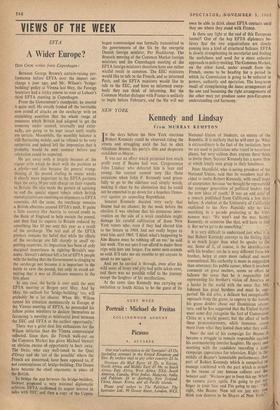VIEWS OF THE WEEK
EFTA
A Wider Europe?
DON COOK writes from Copenhagen :
Between George Brown's curtain-raising per- formance before EFTA over the import sur- charge a year ago, and Mr. Wilson's 'bridge- building' policy at Vienna last May, the Foreign Secretary had a tricky course to steer at Labour's third EFTA meeting in Copenhagen.
From the Government's standpoint, he steered it quite well. He stoutly fended off the inevitable new round of attacks on the surcharge with an unyielding assertion that the whole range of measures which Britain had adopted to get the economy under control, internally and exter- nally, are going to be kept intact until results are certain. Meanwhile, the monthly balance is still fluctuating widely, and he refused to be very optimistic and indeed left the impression that it probably would be next summer before any relaxation could be expected.
He got away with it largely because of the vigour with which he dealt with the problem as a whole—and also because the general streng- therting of the pound sterling in recent weeks is clearly more important to the EFTA partners than the extra 10 per cent charge on their exports to Britain. He also made the gesture of agreeing to end the special export rebate which British manufacturers are receiving on shipments to EFTA countries. All the same, the surcharge remains a British albatross around EFTA's neck. It pains a little country like Austria to extend credit to the Bank of England to help sustain the pound, and then find its exports to Britain reduced by something like 10 per cent this year as a result of the surcharge. The real nub of the EFTA protests remains the belief that while the effects of the surcharge are felt sharply in small ex- porting countries, its imposition has been of only marginal importance in righting Britain's eco- nomy. Stewart's defence left a lot of EFTA people with the feeling that the Government is clinging to the surcharge not because it is important in the battle to save the pound, but only to avoid ad- mitting that it was an ill-chosen measure in the first place.
In any case, the battle is over until the next EFTA meeting at Bergen next May. And by May, the outlook for 'bridge-building,' too, will probably be a lot clearer. When Mr. Wilson turned his attention momentarily to Europe at the Vienna meeting of EFTA, he persuaded his fellow prime ministers to declare themselves as favouring 'a meeting at ministerial level between the EEC and EFTA at the earliest opportunity.'
There was a great deal less enthusiasm for the Wilson initiative than the Vienna communiqué reflected. Since then, the French walk-out on the Common Market has given Michael Stewart an obvious excuse of opportunity to back away. The Swiss, who stay well-tuned to the Quai d'Orsay and the 'art of the possible' where the French arc concerned, have been opposed to, if not contemptuous of, bridge-building. The Danes have become the chief exponents in place of the, British.
To bridge the gap between the bridge-builders, SteWart proposed a very minimal diplomatic solution. EFTA reaffirmed its urgent interest in talks with EEC and then a copy of the Copen- hagen communiqué was formally transmitted to the governments of the Six by the energetic Danish foreign minister, Per Haekkerup. The Brussels meeting of the Common Market foreign ministers and the Copenhagen meeting of the EFTA foreign ministers therefore have one rather wistful result in common. The EEC ministers would like to talk to the French, and so informed Paris, and the EFTA ministers would like to talk to the EEC, and have so informed every- body they can think of informing. But the Common Market dialogue with France is unlikely to begin before February, and the Six will not even be able to think about EFTA contacts until they see where they stand with France.
Is there any light at the end of this European tunnel? One of the key EFTA diplomats be- lieves that the two organisations are slowly coming into a kind of structural balance. EFTA is slowly strengthening its secretariat and finding the usefulness and need for a more cohesive approach to policy-making. The Common Market, on the other hand, under assault from the French, seems to be heading for a period in which,its Commission is going to be reduced in powers, authority and operation. The long-term result of strengthening the loose arrangement of the one and loosening the tight arrangements of the other may yet produce some pan-European understanding and harmony.






































 Previous page
Previous page